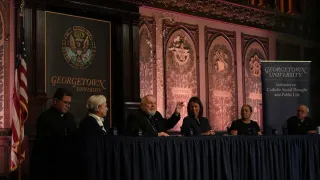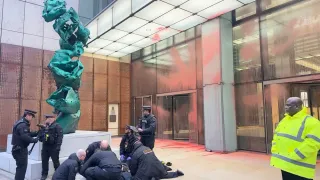October 30, 2014
Judges to Hear Case of San Diego Man Arrested for Wearing Gladiator Kilt
Winnie McCroy READ TIME: 2 MIN.
The case of a man arrested for public nudity in 2011 for wearing a leather gladiator kilt during the city's annual Gay Pride Parade is now making its way through the court system. A panel of judges will decide on a recently filed appeal from San Diego resident Will Walters, and determine whether the police department's policy is legal.
The San Diego Reader reports that Walters and his lawyer are accusing the city of using a double standard when enforcing the city's 'special events nudity policy,' that cracks down on nudity at the city's gay events, while permitting much more revealing outfits at beaches and their Over the Line tournament.
Earlier this year, U.S. District Court judge Ann Bencivengo dismissed Walters' claim of discrimination and harassment, but the courts will now hear his appeal that alleges that certain commanding officers had made up their minds to target Gay Pride Parade attendees before the event even began.
"In the days and weeks leading up to the 2011 San Diego Gay Pride Event, Lieutenant David Nisleit, the newly appointed head of the San Diego Police Department's Special Events Police team met with the Pride event organizers and volunteers to discuss his enforcement policy," reads the appeal. "As for public nudity, in particular 'skimpy' bottoms, Nisleit announced that he was abandoning the policy of his predecessor...and was replacing it with his own interpretation.... Under Nisleit's new policy, all attendees and parade participants would now be required to 'fully cover their buttocks.'"
Organizers at the meeting reportedly asked Nisleit whether the policy would extend to women in G-strings at the beach, and although he said it would, Walter's attorney Christopher Morris noted in his appeal that "the city produced 104 redacted citations and reports [from the past five years]. In not one of those reports was a person arrested or cited for wearing a thong or G-string type bathing suit bottom."
Walters' was also wearing a thong, but it was covered by a leather kilt, fashioned with a 12-inch long and 8-inch-wide flap in both the front and back. However, policy called it "borderline," and despite the fact that Walters' said he has worn the same kilt the previous year, Nisleit removed him from the parade and wrote him a citation. When he refused to sign it, they placed him in handcuffs and transported him to jail for 'public nudity.'
Walters lawyer is determined to expose what he calls their "Gay Special Events Nudity Policy," with some supporters saying that just because the arresting officer claimed they didn't harbor the intent to discriminate, doesn't mean it wasn't discrimination.
EDGE posted a similar story in March 2013, after San Francisco passed a new law banning open nudity in the city. This city also made a 'special events nudity policy,' except in this case, it gives special exemptions for some nudity at "permitted parades, fairs and festivals," such as the Gay Pride Festival or Folsom Street Fair.
But this legislation, Section 154 of the police code, defines nudity not as thong wearing, but rather says that a person "may not expose his or her genitals, perineum or anal region" in public places including sidewalks and parklets.






